A Risky Faith Stepping into the Future
Easter Camps
Jailed for Jesus
May 2023 | saltmagazine.org.nz
The Next Step

8 A Risky Faith
Captains Doug and Janet Newman share the challenges and opportunities of ministering in the Middle East.

14 Steps of Courage
The legacy of courage and faith forged at the commencement of The Salvation Army in New Zealand is alive and active today.
16 Morals from My Moa (Chicken)
How raising chickens led to a deeper understanding of God’s love and concern for us.
18 Fully Content in God
Mike Dear attends Recovery Church in Thames and shares his journey out of addiction to faith in Christ.


20 A Door Wide Open to the Future
Replanting Wellington City Corps to become The Salvation Army Cuba Street was a journey of discomfort, resulting in hope and revitalisation.

33 Jailed for Jesus
Captain Ellen Gibson faces opposition and challenge in her mission to establish the work of The Salvation Army.
SALT Magazine
The Salvation Army New Zealand, Fiji, Tonga and Samoa Territory
Territorial Leaders
Commissioners Julie and Mark Campbell
General
Brian Peddle
Founders
Catherine and William Booth
Editor Vivienne Hill
Graphic design Sam Coates, Nicole Gesmundo, Lauren Millington
Staff writers
Jules Badger, Hope Burmeister, Captain Rachel Montgomery, David Youngmeyer
Proof reading Colleen Marshall
Connect with us saltmagazine.org.nz

SalvationArmyNZFTS @SalvationArmyNZ salvationarmynzfts
Territorial Headquarters, 204 Cuba Street, PO Box 6015, Marion Square, Wellington 6141 p: (04) 384 5649
e: salt@salvationarmy.org.nz

All Bible references from the Holy Bible, New International Version, unless otherwise stated. Views and opinions expressed do not necessarily represent those of The Salvation Army. Articles are copyrighted to The Salvation Army, except where indicated, and may be reprinted only with permission.

19 26
15 34 28
20
09
Management
Publishing for 139 years Volume 3, Issue 1 ISSN 2816-1351 (Print) ISSN 2816-136X (Online)
Subscriptions mailorder@salvationarmy.org.nz Print
MakeReady
Contents 2 May 2023
Stepping into the Future
elcome to the renamed territorial magazine SALT, formerly titled War Cry. The name SALT is an acronym for Salvation Army Life and Times. The name also reflects the biblical metaphor of salt as preserving, seasoning and adding flavour. Salvationists are also commonly known as ‘salt of the earth-type people’.
We are not the first territory in The Salvation Army world to change the name of our magazine; for example, our near neighbours Australia changed their name a few years ago from War Cry to Salvos. Our focus is still to inform our internal readers of events and happenings within the Army world, we have just broadened it to attract a readership not yet part of the Army.
Our decisions for changing are many and varied, but ultimately it is a shift in direction for the magazine: we are aiming to place SALT in every Family Store in New Zealand to be made available to the public. Our hope is that the stories, testimonies, biblical reflections and life of The Salvation Army will be a window into the wonderful work taking place
in this movement, but also a witness to the life-changing power of the gospel.
The world is in a season of great change and that can be disorienting, but it can also be a time of opportunity. In our feature on page 20, ‘A Door Wide Open to the Future’, Captain Daniel Buckingham talks of the discomfort of change, but not making this a reason not to change. He acknowledges the discomfort but encourages us to courageously step into that discomfort, trusting God to guide and direct us into what comes next.
Our cover image of a worn shoe paired with a new shoe speaks to the intent of the magazine as not replacing anything, but a continuation of our call to preach the gospel of peace on every occasion. Please walk with me as we step into the future and navigate by the leading of the Holy Spirit to those who need the good news
Vivienne Hill Editor
saltmagazine.org.nz 3
Stand firm then, with the belt of truth buckled round your waist, with the breastplate of righteousness in place, and with your feet fitted with the readiness that comes from the gospel of peace. In addition to all this, take up the shield of faith, with which you can extinguish all the flaming arrows of the evil one. Take the helmet of salvation and the sword of the Spirit, which is the word of God. EPHESIANS 6:14–17
SALVATION ARMY PRAYER
Please keep those impacted by Cyclone Gabrielle in your prayers. We continue to pray for the Kingdom of Tonga rebuilding after the eruption and tsunami; Auckland City Korean Corps; Ba Corps; Blenheim Corps; Blue Mountain Adventure Centre; Booth College of Mission; Bridge Recovery Churches; Bridge centres around the territory; The Salvation Army in Malawi and The Salvation Army in Mali.
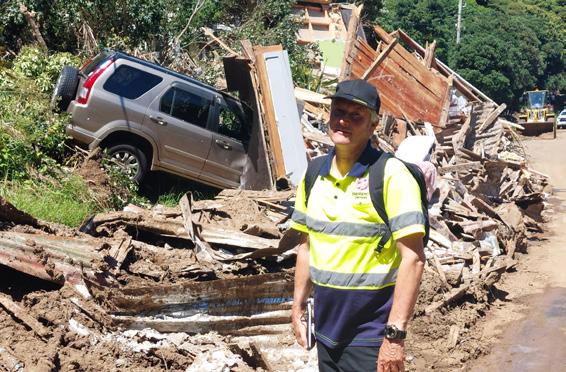
What’s On?
Red Shield Street Appeal
8–14 May
Support The Salvation Army’s national appeal by finding a collector holding a donation bucket in your local city or town, and
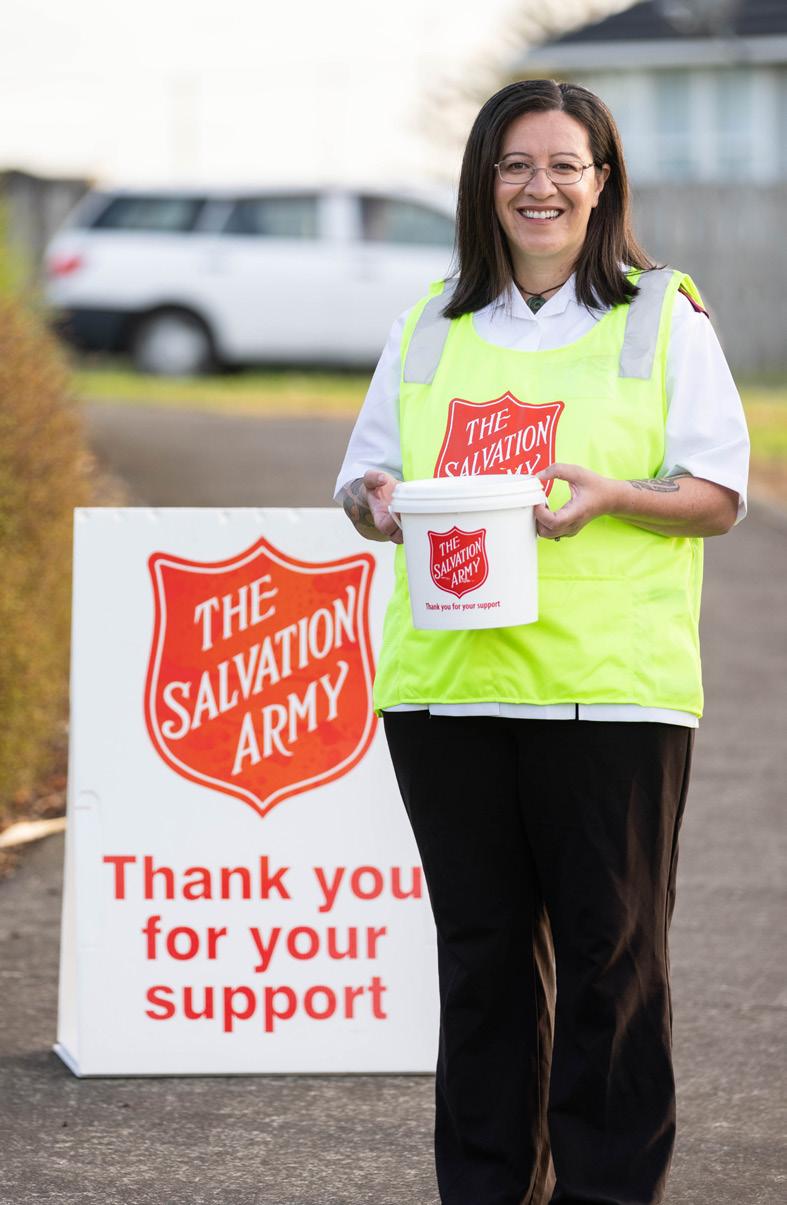
INTERNATIONAL PRAYER
• Burkina Faso—Pray for healing for Christians deeply affected by persecution and for protection of believers and church leaders in the country.
• Central African Republic—Pray for safety of church communities under the threat of armed groups. Pray for churches to be able to operate safely and for Christians to live in their homes without fear.
• Turkmenistan—Pray for church leaders to have courage in their dealings with authorities, and that all believers will be able to safely access Bibles and Christian media.
• Cuba—Pray that Christians will be allowed to worship freely. Pray for believers to have the strength to speak up for what they believe.
• Morocco—Pray for Christians to be able to gather freely and for believers to find employment and not be discriminated against because of their faith.
donate to support the work of the Army.
Just Action Conference
23 May, Johnsonville Corps
Save the Date 9–10 September
Corps Anniversary
Red Shield Street Appeal
Corps Anniversary
This year the Red Shield Street Appeal is back on the streets with our recognisable buckets. Sites are booked and corps (churches) are recruiting collectors. If you have an hour to spare, please get in touch with your local corps and sign up to help today. Get excited, New Zealand! This is our time to shine in the public arena— enjoy and wear our shield with pride! All money raised supports our Community Ministries. The collecting will take place from 8–14 May in various locations around New Zealand.
Can’t collect? Still want to support your local centre? Visit helpthesallies.nz , search for your centre and make your donation online.
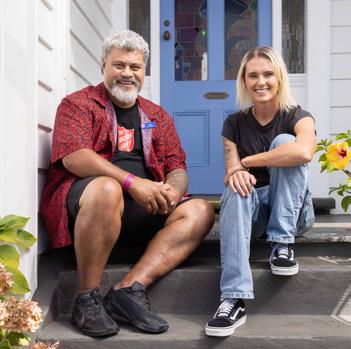
This year’s conference tackles the issue of alcohol harm, and the role of community action. Invercargill
3–5 November Kilbirnie Corps Anniversary
Alexandra
18–19 November
4 May 2023
15–17 December Fiji Division 50th Anniversary
Stepping into Life: Twelve-Step Meditations for Aotearoa
Self Help, Devotional | Major Sue Hay | Flag Publications
Stepping into Life is a book of devotions by Major Sue Hay—and published by our territory’s own Flag Publications—that interacts with the 12 Steps programme from Alcoholics Anonymous to share encouragements for the recovery journey. The welcoming and down-toearth tone from these stories—about feijoas, ferry misadventures and smoke alarms—invites readers to consider their experiences and work towards wholeness in their own lives. A great strength of these reflections is the way that Sue continues to draw notice back to God in her conversations about healing and points the reader towards him as well, with gentleness and curiosity. (Reviewed by Holly Morton-Chong)
Alabaster Co. Music
Instrumental Worship | Alabaster Co. | Listen on Spotify, Apple Music, Amazon Music
This collection of instrumental music by Alabaster Co. is a collaborative work with various artists. It is produced to help inspire creativity, worship and reflection. The themes of the songs focus on the books and character stories in the Bible such as The Song of Mary and recently released singles, Exodus and Hebrews Some little-known tracks like Ephesians, Romans Pt. 1, Ecclesiastes, and The Songs of the Angels are my personal favourites. The collection evokes different emotions—joy, comfort, lament, peace and reverence that encourages contemplation. It is a soothing and creative resource that can be accessed during moments of personal reflection.

(Reviewed by Nicole Gesmundo)

Living
Drama
When jaded, lonely and adrift civil servant Rodney Williams (Bill Nighy) receives bad news from his doctor, he desperately explores how to put meaning back into his remaining life. Set in postwar London, this British production— an adaptation of the 1952 Japanese film Ikiru —features a screenplay by Kazuo Ishiguro, author of The Remains of the Day Living successfully creates an atmosphere of stultifying bureaucracy, restrained social mores and unsupportive family, all of which serve to amplify Williams’ struggles. Nighy delivers a deeply poignant and memorable performance, supported ably by rising co-stars Aimee Lou Wood and Alex Sharp. (Reviewed by David Youngmeyer)

Do You Know These People?
If you recognise the people in this photo, we’d love to hear from you. Email: archives@ salvationarmy. org.nz
 By Major Sue Hay
Stepping into Life twelve-step Meditations for Aotearoa
| Directed by Oliver Hermanus | See in theatres or watch on Amazon Prime
By Major Sue Hay
Stepping into Life twelve-step Meditations for Aotearoa
| Directed by Oliver Hermanus | See in theatres or watch on Amazon Prime
Everyone thinks of changing the world, but no one thinks of changing [themselves].
saltmagazine.org.nz 5
LEO TOLSTOY
QUICK QUIZ
1 What was the previous name for a Snickers bar in the UK before it changed in 1990?

2 Saying the name of what dried fruit was used to encourage people to smile for a photo in the 1800s, before the phrase ‘cheese’ became common?
3 In what year did The Beatles split up?

4 Which year did the European Union first introduce the Euro as currency?
5 Which former British colony was given back to China in 1997?
Answers page 32

Life Hacks: Change
Change isn’t always a bad thing, and in fact there are many small changes you can make in your life to see positive long-term impacts. Try to wake up earlier than you normally would. This may only be 30 minutes earlier, but giving yourself time to have a slow morning reading, tidying up or doing a puzzle can set you up for a productive day ahead. If you can, give yourself time to walk or bike to work or university, or wherever you need to be. Doing this not only saves money on petrol or bus fares but gets your body moving, your endorphins flowing and gives you a chance to reflect and listen to a podcast. Last, try to develop a ‘clean as you go’ attitude, instead of letting clutter build up and become a bigger task than it needs to be.

WORD OF THE MONTH
Feliliuaki (Tongan, adjective) Changeable.
Source: education.nsw.gov.au
Source: Please Don’t Pray With Your Mouth Full , by Bob Swanson.
6 May 2023
Photograph: Capitol Records.
Herby Pumpkin and Sausage Gnocchi

You can make your own gnocchi, but a pack of store-bought stuff from the supermarket is used in this dish. | 45 mins | Serves 4–6
Ingredients
• 500g pumpkin, deseeded
• 2 Tbsp olive oil
• 500g package potato gnocchi
• 1 cup button mushrooms, cut in thick slices
• 3 herby sausages
• 1 red onion, chopped
• 3 cloves garlic, crushed
Method
• ½ cup chicken stock (½ tsp stock powder dissolved in ½ cup boiling water)
• 1 cup cream or evaporated milk
• ½ tsp sage
• ½ tsp Italian herbs
• ⅓ cup grated parmesan
• ½ cup grated cheese— add some mozzarella if you want a bit of stretchy action
Preheat oven to 210°C. Spray a rimmed baking tray with non-stick spray. Peel pumpkin and cut into 1.5cm pieces. Spread in greased baking tray, toss with half a tablespoon of the oil and roast 20 minutes or until tender. Cook gnocchi according to pack directions. Heat remaining oil and cook mushrooms until golden; remove and set aside. Split sausages and tip the filling into the pan. Cook, mashing with a fork or masher until crumbled and turning golden, mix in onion and garlic and cook till soft. Add stock, cream, herbs, parmesan and when simmering add the gnocchi. Simmer until beginning to thicken. Fold in pumpkin and mushrooms and top with grated cheese. Grill or bake until golden on top. Serve with salad or cooked seasonal vegetables.
Tip: This is one of those recipes that is easy for every day, but good enough for guests. You could divide the mixture into individual dishes for a more elegant presentation. Evaporated milk provides a creamy alternative you can keep in the pantry if you don’t use fresh cream. Lite evaporated milk is lower in fat, but won’t thicken without adding cornflour. If using evaporated milk you need to take a little more care to ensure it doesn’t burn on the bottom.
Source: Sophie Grey | destitutegourmet.com
1 Butterflies
Butterflies start out as an egg, then hatch as a caterpillar and go through up to five molts. The caterpillar then finds a twig on which to develop into a chrysalis. This takes between a few days and twelve months—when out comes a new butterfly.

2 Frogs
Frogs also first come from an egg, then hatch into a tadpole with a tail and internal gills. The tadpole gradually forms into a frog, which takes place over 14 weeks, developing legs, arms and lungs.
3 Jellyfish
The jellyfish starts out as an egg, turning into several polyps before becoming an adult jellyfish. A jellyfish is the only animal that can revert back to its juvenile form after already forming into an adult.
4 Spiders
Spiders start from an egg and develop into a spiderling that spends a week on its mother’s back. A spiderling is very similar in appearance to an adult spider. Their exoskeleton (external skeleton) doesn’t grow by itself, so they will shed it many times until it’s strong enough.
saltmagazine.org.nz 7
A Risky Faith
Captains Doug and Janet Newman are the regional leaders of The Salvation Army in the Middle East. On their recent return to New Zealand for homeland furlough, the couple spoke to SALT about the challenges and opportunities of serving in a region where it is illegal to publicly express Christian faith.
WORDS Jules Badger
hen you are used to having total freedom of expression around who you are in Christ, and then you come and live in a country where any expression of Christian faith puts you at risk of being arrested by the religious police—well, it puts things in perspective,’ says Doug.
‘The very fact that we are able as Christians to be in these countries, let alone worship and minister, is huge,’ explains Janet. ‘Yes, there are very specific and strict guidelines we must adhere to, but for The Salvation Army to have a presence here … I can’t stress how incredible it is.’
Doug and Janet live in Kuwait, where regional headquarters for the Middle East is situated. They are also the corps officers for Kuwait Corps (church) and the couple have direct oversight of the burgeoning work in the Kingdom of Bahrain. Doug and Janet have regional responsibility for three corps in the United Arab Emirates (UAE) and three corps in Oman. The latter are led by regional assistants—South African officers, Majors Jeff and Margaret Stafford. The two couples make up the officer force for the entire Middle East Region.
Geographically, it’s a complex operation. ‘The UAE is thought of as a country’, explains Doug, ‘but it is actually a collection of seven separate emirates with a federal system where each emirate has their own rules but, collectively, they form a block known as the UAE. The work in Kuwait and Bahrain sees eight corps in eight Islamic countries, which is just amazing. In Qatar—between Bahrain and the UAE—where the FIFA
World Cup was held, there is currently an expansion project to officially recognise a corps there. And we recently had Salvationists who are working in Saudi Arabia reach out for spiritual support.’
Same but different
In Kuwait, Christian leaders and pastors can no longer access religious residence visas. In fact, two and a half years ago the government reduced the number of religious visas from 80 down to 18. Doug explains that there have been multiple requests to reverse this, but the government can’t see the need with so many Christians in the country already.
‘It’s easy to understand why when you consider that Muslims worship together at the local mosque—the closest one to where they are at any given time. So, Christians wanting visas to worship separately in their denominations makes no sense to them. “Why can’t you worship together? Aren’t you all one?” They don’t understand the breadth of Christian theology, belief and practice—it’s a bit of a mystery to them and a challenge for us,’ explains Doug.
Kuwait Corps meets in a sanctioned church compound. ‘We are sponsored under the National Evangelical Church of Kuwait (NECK) and each congregation meets in a hall within the compound and is allocated a time slot. For some time now, The Salvation Army in Kuwait has met at 7pm on a Saturday evening. We have two rooms, one for church and one for children’s church, and we only have them for two hours which is
8 May 2023
very limiting. But we cannot meet in our house—that is illegal,’ explains Janet.
Dangerous liaisons
The subtle differences between countries in the Middle East mean that Doug and Janet must be highly adaptable, and very careful. All eight countries are Islamic, with each one having different government systems, so what Doug and Janet can and can’t do— and how they do it—changes as they move between countries. For example, the wearing of Salvation Army uniform can be dangerous in some countries, and not an issue in others.


‘In Kuwait we don’t wear our more military-style uniforms with white shirt and epaulettes unless we are in the church compound, because it’s a safety issue. It’s about how “army” is seen and recognised,’ says Janet. ‘The only uniformed people in Kuwait are the Ministry of Interior—the police. So, our soldiers in Kuwait will cover their epaulettes when outside or not put them on at all until they are safely inside,’ explains
Janet. Red Shield branded business shirts and polo tops are the go-to for Doug and Janet when moving around Kuwait.
‘There is no Arabic word for salvation—not salvation as we understand it,’ says Doug. ‘And while there is certainly understanding of the word ‘army’, it has very bad connotations. There is even a registered terrorist group called The Salvation Army! It’s not big, but it’s there. So, we are in the process of trying to work out—as has been done in other countries in the Army world—an appropriate identifier for us.’
Kingdom come
It’s a very different story for The Salvation Army in the Kingdom of Bahrain. In March, eight new soldiers were enrolled at Bahrain Corps (pictured over the page). ‘Our main goal for 2023 is to expand the work there, and God is opening doors for us,’ says Doug.
Last year Doug was made aware of a conversation that had taken place between someone from The Salvation Army’s International Social Justice Committee (ISJC) and the under-secretary for political affairs with the Ministry of Foreign Affairs. It was mentioned that
saltmagazine.org.nz 9
Above, from left: Captains Doug and Janet Newman enjoying Kuwait; Janet making friends with a camel!
The Salvation Army is in over 130 countries, with the response being: ‘Why aren’t you in Bahrain?’ Doug wrote to the under-secretary and secured an invitation to meet with him and other officials.

‘His Excellency expressed a desire that we become an independent church in Bahrain, rather than just a sponsored group under the Anglican umbrella.
Bahrain would be the first country in the Middle East to officially recognise The Salvation Army, and they agreed to support us with a roadmap of how to become independently registered,’ explains a very excited Doug. ‘They want us to move our regional headquarters to Bahrain and for that to become the centre for Salvation Army operations in the Middle East. Bahrain is the most progressive, multi-cultural, multi-faith country in the Middle East. There are even Jewish synagogues, and we can wear full Salvation Army uniform in Bahrain.’
Janet is also excited by the possibility of being able to have a church building. ‘We could establish a base and have a home church. We could also do some form of Community Ministries and set up a Family Storetype business, so The Salvation Army would have a community presence.
‘We would of course need more officers. We can’t leave Kuwait without leadership because it is the biggest corps in the region with a roll of around 135,’ explains Doug.
Mission to the marginalised
The Salvation Army in Kuwait, like elsewhere in the Army world, is about mission to the marginalised. In Kuwait that means going into the deportation centres. Kuwait has a population of five million, with

1.2 million being Kuwaitis, and the rest ex-pats from around the world who have come for work. But there are things that can and do go wrong. If someone’s visa becomes invalid or they lose their employment, they can find themselves arrested for being in the country illegally and sent to the deportation centre. Janet is very passionate about this ministry of encouragement to isolated Christians, as well as the opportunity to share the gospel with other detainees.
‘There are three large rooms with bed bunks—200 women per room—waiting to be deported,’ explains Janet. ‘They are waiting for processes to be completed like the purchasing of tickets to go home which can
Above: New soldiers being enrolled at Bahrain Corps.
10 May 2023
‘We go in and try to bring a bit of light and when we arrive often the women have tears in their eyes because they know they haven’t been forgotten.’
take months. They have no cellphones or contact with the outside world—no family, no one. It is a very bleak place. We go in and try to bring a bit of light, and when we arrive often the women have tears in their eyes because they know they haven’t been forgotten. The Christians get called forward and we pray and worship and share the Word, with everyone else in the background listening—you just never know what they might take in! We also take in clothes, and money so they can buy shampoo. At Christmas it’s winter warmth packages because it gets very cold.’
Christians we don’t need specific times to pray, and like other Christians I have ongoing conversations with God while walking up the stairs or emptying the bins. But that specific regular call to prayer is an opportunity—a reminder to be very specific in prayer.’
Janet adds, ‘Going through the season of Ramadan last year I couldn’t help but think wow, these guys are so committed.’
Basking in the familiar
Doug and Janet have enjoyed being back in New Zealand for a short period. ‘It’s been great to just bask in the familiar,’ says Doug, who couldn’t wait to eat a pepper steak pie from the BP service station! For Janet it was lollies, pork and being able to speak fast. Both agree it’s been great to see family and friends … and rest. But both Doug and Janet are understandably excited about the ministry and mission waiting for them as they return to the Middle East for their second year as regional leaders.
Called to prayer
There are churches in every community here in New Zealand, but in Kuwait there are mosques everywhere. The key difference in terms of daily spiritual life are the calls to prayer that ring out from loudspeakers across the city. There are five in a 24-hour period.
‘It is quite a melodious voice,’ says Doug. ‘There are prayer rooms all over the place, including the malls. Everyone knows when those prayer times are, so it’s not a surprise to anyone. Some of the smaller neighbourhood shops will just pull the door down for prayers and the shop empties out.’
‘Friday is holy day and midday prayers are the most important of the week,’ explains Janet. ‘Outside our house we get people lined up to pray, two to three people deep on the side of the road.’
‘We have become so very aware of the Muslim commitment to prayer—to their faith. Puts us to shame really,’ says Doug. ‘But on the flipside, whenever I hear the call to prayer, I use it as a reminder to pray. As
The Salvation Army in the Middle East
‘They want us to move our regional headquarters to Bahrain and that become the centre for Salvation Army operations in the Middle East.’
OMAN UAE
saltmagazine.org.nz 11
BAHRAIN YEMEN SAUDI ARABIA IRAQ IRAN SYRIA TURKEY LEBANON ISRAEL KUWAIT
Insight from Easter Camp Leaders
The SALT team asked leaders at Northern and Southern Easter Camp four questions to discover what it’s like to lead young people at camp. 1 How did you first become a youth leader? 2 What’s the best part about being a youth leader at Easter Camp? 3 How have you seen the young people grow through this camp? 4 What’s some advice you would give to young people wanting to lead? Here is a selection of their answers.
Southern
Beaven Turner Sydenham Corps
3 The young people have grown both spiritually and emotionally. They’ve been a good support to each other. It’s been great seeing them calling out to their Lord in worship.
4 Find somewhere to start. Have a chat with the leaders and see where you can start. It doesn’t have to be something big to begin with.
Olivia Stanton Sydenham Corps



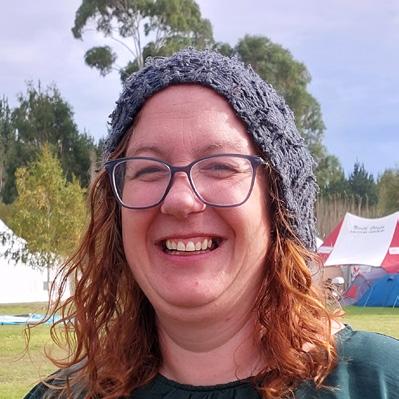
1 I was actually never part of the Sydenham youth group.
My cousin Beaven Turner needed another youth leader so I helped him out with one event. After that camp, I was sold. I said, ‘Beaven, can I talk to you about being a permanent youth leader?’

3 Some youth have some tough stuff going on. When they’ve finally been able to share a little bit about what that’s like, just to
let that sit with youth leaders, they feel acknowledged and upheld.
Letisha Derham Linwood Corps
1 I’ve been leading since 1994, so about 30 years. Mainly working with children, not necessarily always with youth.
2 Having time to build relationships with the youth, seeing them come out of their shells and being exposed to worship in a different way than they are in their corps.
Kaitlyn Bunz Rolleston Corps
3 Most of my young people have never been in an environment like this or are very reserved in general. This year, one made a decision for God. One shut her eyes for prayer and feels very curious. One other opened up to me tonight.
4 Just get involved. Get involved in whatever you can. It’s so rewarding getting to see other young people grow.
Lucy Boyd
Christchurch City Corps
2 Getting to know the kids and seeing them slowly form bonds and get to experience Easter Camp for the first time, because it didn’t happen last year due to Covid-19.
3 Our group didn’t answer questions. They didn’t talk. But by the end, we were getting answers and they’re talking to each other.
4 Don’t be afraid. You never know what you’ll get out of it or what the young people will get out of it from you.
Junho Kim
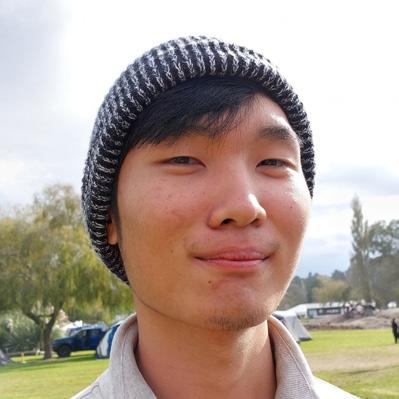
Christchurch City Corps
2 I like watching the day-to-day changes in each of them. As the days go on, you see them become more and more engaged, and having our talks after each meeting is always great.
4 You might think youth leaders are perfect, but that is completely false. You don’t need to know everything to become a youth leader. Everyone starts somewhere.
12 May 2023
Northern Tamzin Ling
Albany Bays Corps
1 I started going to the 7Up programme in Albany Bays when I was in Year Seven and I’ve just continued through to youth. I’m a junior leader in training now.

2 Honestly, the youth. Everyone’s really cool to hang out with and it’s cool to see how they grow throughout the camp as well.
3 I’ve seen how some of the youth over the years have changed after camp, become more confident and comfortable with themselves.
2 I think just getting to know the kids a lot more than usual and seeing them connect with each other and seeing their different personalities.
Richard Bray

Hutt City Corps
2 Seeing the young people grow, watching them go on their journey, and to be able to continue that when they go home as well.
3 We’ve become more of a family. Before camp it was more split, but by putting the whole group together, it has definitely brought them together as a community.
Sarah Opie Tawa Corps


1 I started when I was 18. Through my journey into The Salvation Army, I became the Community Ministries and youth coordinator at Tawa Corps because I love youth.
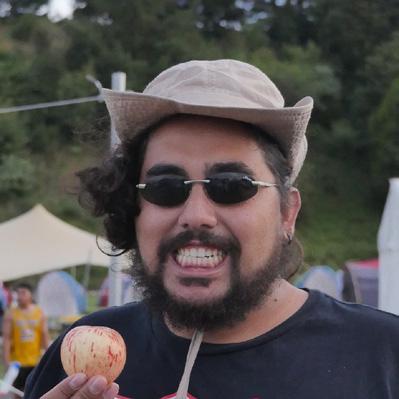

3 I’ve had two young people from the community in our group who have experienced the Holy Spirit as a rushing wind, a warm presence and an overwhelming sense of peace.

4 Follow what God’s saying and directing. Trust your gut and if you’re not sure, double check with another leader.
2 The best part is being here for our youth to give them as many opportunities as possible to experience God’s presence the whole weekend.
3 I believe the Holy Spirit works in this place and works in them, allowing them to relax and unload some stuff that they might be carrying.
Antonia Leota-Matai’a
Waitakere Central Corps
1 I first became a youth leader because I started as a young person through the youth programme and from there, I just went into the youth leading.
4 Be yourself. Sometimes the best leaders come from who you are inside.
See story on the camps, pages 28–29.
2 Laughing and having fun with young people. Seeing them feel safe enough to be a little bit goofy and a little bit silly.
3 I’ve seen a lot of young people step out of their comfort zones and make new friends. I’ve seen young people try new things, like praying in groups.
4 Be open to serving before leading because I think a leader should be looking out for people. Be willing to serve and have an open mind.
Wi Pirihi Whangārei Corps
Raymond Tuala
Albany Bays Corps
saltmagazine.org.nz 13
Steps of Courage
Courage and commitment have been part of our movement, even before the first Salvationists arrived and commenced the mission of The Salvation Army in Aotearoa New Zealand.
Arabella Valpy showed tremendous courage in 1882, when she wrote from her home in Dunedin to General William Booth in London, urging him to send officers to New Zealand. She was so committed and convinced that the people of New Zealand needed to hear of the transforming love of Jesus through The Salvation Army, that she sent money with her letter to cover travel expenses.
In 1883, Captain George Pollard and Lieutenant Edward Wright arrived in Dunedin. Despite opposition and ridicule, a small group of Salvationists preached the Word of God, cared for people and spread the mission. We are still here today because of the courage and commitment of these pioneers and many Salvationists who saw a need and stepped out in faith and in the love and power of God.
It’s the love and power of God that enables us to serve our community with courage and commitment through preaching the good news of salvation through Jesus, transforming the lives of people and seeing communities reformed.
Following Jesus’ death and resurrection, he met with his disciples in many different ways to transform their fear to courage and their uncertainty to commitment. In his final words of instruction Jesus told the disciples they were to continue his mission of love, forgiveness and hope in God. This would not be an easy mission; it would be humanly impossible and only the power of God would enable them to stay courageous and committed. In the Bible, the book of Acts is full of incredible stories of how God worked in and through these men and women of faith. The power of God is still at work! At the Northern Easter Camp, we met hundreds of teenagers and listened to many stories of how they have found a place to belong in youth programmes and youth groups, and how they are exploring faith in Jesus there. I thank God for the courage and commitment of our youth leaders who are passionately and patiently helping these young men and women to live for Jesus in a very challenging world.
I pray that we will all step out in courage, commitment and the power of God today: all of us together sharing our faith and love for Jesus and using our skills, experience and qualifications to fulfil our mission.
Commissioner Julie Campbell Territorial President of Women’s Ministries
Acts 1: 8
But you will receive power when the Holy Spirit comes upon you. And you will be my witnesses, telling people about me everywhere—in Jerusalem, throughout Judea, in Samaria, and to the ends of the earth (NLT)
Otiia, ka riro he kaha i a koutou, ina haere mai te Wairua Tapu ki runga ki a koutou,ā, hei kaiwhakaatu koutou mōku ki Hiruhā-rama, ki Hūria katoa, ki Hamaria hoki, ā tae noa ki te pito whakamutunga o te ao (PT).
Ia dou na rawata na kaukauwa, ni sa lako mai vei kemudou na Yalo Tabu; dou na qai dautukuni au mai Jerusalemi, kei Jutia taucoko, kei Samaria, ka yacova nai yalayala kei vuravura (FOV)
Lekin tumhaar uppar Pawitr Aatma aai aur tumme taagat mili aur tum hamaar baare meñ Yarushalam meñ, puura Juḍia meñ, Samaaria meñ aur dunia bhar meñ parchaar karega (FRHNT)
Ka te mou ma‘u pe ha mālohi, ‘o ka hifo ‘a e Laumālie Ma‘oni‘oni kiate kimoutolu: pea te mou hoko ko ‘eku kau fakamo‘oni, ‘o ‘ikai ‘i Selusalema pe, ka ‘i Siutea kātoa, mo Samelia, ‘io, ‘o a‘u ki he ngata‘anga ‘o māmani (TMB)
A e peitai, o le a maua e outou le mana, pe a afio ifo le Agaga Paia i luga ia te outou; e fai foi outou ma molimau ia te au i Ierusalema, ma Iutaia uma lava, ma Samaria, e oo lava i le tulu‘iga o le lalolagi (SOV).
14 May 2023

Morals from My Moa (Chicken)
On an outer island of Tonga in September 2021, Captains Selalina and ‘Eliesa Prescott were gifted a hen. Selalina shares with readers her delightful insights gleaned from caring for Speckles.

‘Be gracious to me, O God, be gracious to me, for my soul takes refuge in you; and in the shadow of your wings I will take refuge until destruction passes by’ (Psalm 57:1, NASB).
After Speckles lost her first brood of chicks, I found her lying outside in the rain, drenched and almost dead. For several days she could not perch
or even open her eyes. She just lay down with her head drooping. My husband ‘Eli and I used a syringe to feed her regularly with coconut milk and gave her penicillin dissolved in water. We only had a glimmer of hope that she’d make it, and we did what we could. With prayers and care, Speckles started
trying to perch on low places, her eyes gradually opened and she started moving around. Finally, she was well enough to be released outdoors again. We were immensely grateful to God that she had survived
Sparrows, chickens and second chances
Speckles had chicks again. This time three survived: two females, Kelo (brown) and `Uli`uli (black), and one male. While Speckles was raising her chicks, I was continually reminded that she’d been given a second chance. It reminded me of the movie Second Chances (1998), which is based on a true story. Various characters in the movie are given second chances in different ways. Caring for Speckles reminds me that God gives us second chances too. We all need a second chance sometimes. In Matthew 10:29–31, God tells us he cares for sparrows (chickens too), so how much more does he care for us?
The third time Speckles was brooding, our neighbour’s hen chased her off her eggs daily to lie there with her chicks. After two weeks of this, Speckles left her eggs for good. When ‘Eli checked her nest, there was only one egg! We wondered if perhaps she had started to lay eggs elsewhere, or perhaps an animal had eaten the eggs, or maybe she’d gone a bit cuckoo and had only laid one egg before brooding. During this season, ‘Eli joked that she needed to earn her keep—we would give her one more chance at raising chicks.
The comeback chicken
After that, Speckles disappeared for a while … and returned with 10 chicks. What a comeback! We were half
16 May 2023
wondering if she’d stolen another hen’s nest on which to brood. While they were still quite young, she chased them away and started laying eggs again. Six of these chicks have survived and are almost fully grown. Most recently, Speckles had another six chicks but left them while they were still too young. After only a couple of days, one of our neighbour’s hens took them in. It was amazing how she treated them as her own, calling them to eat, and defending them from potential threats. Nobody could guess that they were not her own chicks.
Under God’s wings
Her caring for these extra chicks reminds me of Jesus’ sacrificial love for us: he chose to die on the cross to save us from our sins. Her care also speaks to me of the love we are called to give to others in need. What the hen did for those chicks was life-saving, a gamechanger. ‘He will cover you with his feathers. He will shelter you with his wings. His faithful promises are your armour and protection’ (Psalm 91:4, NLT).
I had been watching the chicks to see where they’d sleep so that I could catch them to bring them into our warm house. I even tried to feed them extra food, but I was unable to care for them a s that hen did.


This is how I am to care for those in need, although the actual way will vary depending on the situation. Micah 6:8 (MSG) sums it up, ‘But he’s already made it plain how to live, what to do, what is God looking for in men and women. It’s quite simple: Do what is fair and just to your neighbour, be compassionate and loyal in your love, and don’t take yourself too seriously—take God seriously’.
A burgeoning brood
Kelo and `Uli`uli now have their second lot of chicks. Both times when Kelo was brooding, another hen kept trying to chase her away and sit on her eggs! It seemed Kelo was on a lower pecking order than the other hen. Kelo’s loud angry noises would get my attention, so I tried to help her by chasing the other hen away. Thankfully after one whole day of this happening repeatedly, the hen got the message.
But as I’ve seen from my moa (chicken), God is gracious, caring and loving. He is always there for us.
I have also seen commendable traits in my moa: resilience through hardship, to name one. I thank God for continuing to teach me morals from my moa.
Now, after only a year and a half, we have 22 chickens. They are all descendants of one hen that was given a second chance. Reflecting on her journey and that of her descendants, I understand God’s love for us, although we are imperfect (and some of us have cuckoo moments). Sometimes the hens make unwise decisions, such as trusting pigs who eat chicks!

With prayers and care, Speckles started trying to perch on low places, her eyes gradually opened and she started moving around.
saltmagazine.org.nz 17
Her caring for these extra chicks reminds me of Jesus’ sacrificial love for us: he chose to die on the cross to save us from our sins.
Fully Content in God
Mike Dear attends Recovery Church at Thames Corps and shares his journey from addiction to a life with God.
I came from a dysfunctional family in Auckland. I have two sisters and my parents have been divorced since I was four years old. Growing up in my family, there was a lot of physical, mental and emotional abuse. Out of everything, there was mostly abandonment. We were pretty much left to our own devices.
When I was still in primary school, about nine or ten years old, I was state ordered to go to a Catholic school. I didn’t want to go, but the state was adamant that they wanted me to go. So, I ended up attending the Catholic primary school and secondary school. I was the only one in those schools who wasn’t baptised Catholic and came from a dysfunctional family, so I was treated quite differently.
I remember sitting in the dean’s office. Two other people were in trouble along with me. I remember they got two detentions, but I had detentions for a month straight. I overheard the dean saying, ‘He shouldn’t even be in this school. He’s not baptised’. So, I began to have big resentments against God.
My parents taught me that God is punishing and very judgmental. When I was going to the Catholic school, that’s exactly the thoughts I had. I was never really accepted there. That’s what I thought God was like.
able to have a break and actually be a child again. But that came out in different ways, and I started taking drugs and getting into trouble. It wasn’t that bad at first but as it progressed and as I got older it got worse and worse.
I was living two different lives. I had a good job, and I was also part of Search and Rescue. On the other hand, I was out selling drugs and taking methamphetamine, and in different gangs. This went on until I was 22 when I had to go to rehab. That’s where I learned about a higher power, but it didn’t click with me then. Looking back, I don’t think God thought I was ready.
I was clean in rehab, but as soon as I got out I relapsed. It got worse and worse. A year and a half later, I hit my absolute rock bottom, and everyone had abandoned me. I don’t blame them. I had abandoned myself and I thought God had abandoned me too. I just felt so alone.
I was completely broken, so it was either do something different or commit suicide. I was teetering on the edge, and if I hadn’t got into another rehab I would have committed suicide. One of the rehabs up in Auckland saved my life. They got me in within two weeks. I came into a very loving, accepting community. It didn’t matter where you’d come from or what you had done, you were just family. You didn’t even have to believe in God to belong. That really stood out for me. The change happened overnight. I started reading the Bible and that’s how I came to know God.
In the end, I’d had enough so I started to act out. When I was 13, I was court ordered to move to my nana’s. I thought it would get better, but it didn’t. I didn’t really get a childhood, and when I got moved to Nana’s, I was
It just hit me. I thought, wow, this is where I’m meant to be’. What I’ve learned is that God has always been there. I just didn’t know it. Everything I’ve ever done was all in his plan. What I ended up having to do was delete what I thought I knew about God. I thought he was quite punishing. I had to physically write it down,
18 May 2023
What I’ve learned is that God has always been there. I just didn’t know it.
‘delete it’ and then write down everything I wanted God to be. I took God on in my new understanding and it has worked. After that, there was a big spiritual awakening in me. I even got baptised in the church where I went to rehab.
I just clocked over two years clean. My days get better and better. I started going along to Recovery Church at Thames Corps when I moved to Thames. I was living in Hamilton for a while when I first got clean years ago and I went to Recovery Church there. And when I came back to Thames, I discovered a Recovery Church there, so I started going again. Before finding God, I had this longing for more. Everything was never enough, and I just couldn’t pinpoint it. It was this God-sized hole that I was trying to throw drugs, alcohol, love and affection into. And now that I’ve found God, he’s filled that hole and I’m living a life that’s beyond my wildest dreams. I’ve got a simple life. I’ve got me, my nana and my dog. But I’m content with that. I can sit down now and have serenity, and I have no need for anything.
I’m running a building business and I’ve got some big things going for me, but that’s just a perk. At about four months clean I had nothing. I didn’t even have a car. I had nothing but it was enough even then.
I lost everything in addiction. I lost my family, and I lost over 10 friends who sadly died due to addiction. I lost all my hobbies. But since then, I’ve actually gained a life that is far better and is worth far more.

saltmagazine.org.nz 19
I lost everything in addiction. I lost my family, and I lost over 10 friends who sadly died due to addiction.
A Door Wide Open to the Future
SALT sat down with Salvation Army Cuba Street members Katrina and Peter Hennessey, and mission officers Captains Daniel and Juanita Buckingham to reflect on the challenges and opportunities of replanting Wellington City Corps. So much more than a simple case of one door closing and another door opening—the corps has a new name, a new location, renewed hope and a revitalised mission, fit for the 21st century.
ellington City Corps was one of the first Salvation Army corps established in New Zealand, in 1883. Fifteen years later, the young corps planted its operations on Vivian Street, in central Wellington. The corps that put down roots in 1896 grew quickly and thrived despite early opposition to the Army’s presence in the city. As Wellington itself grew and developed around them, the corps faithfully preached the gospel and served the community. As the decades passed, generations of Salvationists called Wellington City Corps home, and the corps became renowned for its large, exceptional brass band.
The building that currently stands on the Vivian Street site was designed and constructed in 1990. However, consistent problems with the building culminated in it being deemed no longer safe to use in 2021. But God swung wide a door to an interim solution, and for the first time in over 120 years the corps was on the move.
Mission officer Captain Daniel Buckingham explains that, ‘It was not a question of God politely opening the door and waiting for us to go through, but the Spirit calling out to us from the other side of a wide-open door, “You’re coming through now! This is happening! Come on!” And that was good because there had been
lots of great ideas about how to reinvigorate the innercity work of The Salvation Army, and all sorts of reasons why they hadn’t got off the ground. But God was clearly saying, “Now is the time—now is the right time!”’
Generational legacy
Katrina, one of the corps members, was born in 1970 to parents Dixon and Faye McMillan, who had been part of the Wellington City Corps family since the 1960s. Dedicated there as a baby, Katrina’s young faith was nurtured until it bloomed, with the corps being an integral part of her life.
Katrina’s husband Peter, the child of Salvation Army missionary officers Lt-Colonels Don and Lorna Hennessey, arrived at the corps in 1997. The couple was soon married, and for over 20 years served and ministered as faithful church members. Their children Gabriella and Juliana grew up embraced as part of the Wellington City Corps family, just as Katrina had been. Now, as young adults, the girls are both part of the generation leading the freshly replanted Salvation Army Cuba Street. Katrina and Peter are enthusiastic about the replanting of the church and energised by the opportunities, but they first had to embrace the challenge of change.
WORDS Jules Badger
20 May 2023
‘It has been really difficult and we won’t sugarcoat that. There’s no need to pretend it hasn’t been hard. The condition of the Vivian Street building became a huge distraction for us. We’d lost momentum and were struggling to find our way forward as a corps. The mission suffered and so did some relationships. In the end when we were told it was no longer safe to stay in the building, it was a God-send—a relief,’ explains a straight-talking Peter.
‘God had to break us really—it’s been a breaking to open us up,’ says Katrina. ‘Two years ago, I felt quite helpless about the corps. We were stuck. But now there is hope and unity.’
Finding a way forward
Arriving in September 2021, Captains Daniel and Juanita Buckingham knew that challenge and change were ahead. Tasked with leading the replanting of the corps in the inner-city, they had a committed planting team available to them in the people of Wellington City Corps. But the corps was grieving—and fragmented because of the Covid-19 lockdowns.
‘There was a lot of emotion associated with leaving Vivian Street, because this had been the spiritual

home of so many for decades. It was clear that people were carrying a lot of pain because they cared so deeply for the corps,’ explains Daniel. ‘There were also those who really wanted to see new initiatives and growth. Overall, most did not want the shutting down of the Vivian Street building to be the end of the corps’ story—the desire to connect and minister to the innercity community was still strong.’
When the lockdowns were lifted, the offer to meet in Pollard Hall (on level one of Territorial Headquarters on Cuba Street) was accepted by the corps. ‘Reflecting on our time in Pollard Hall, it was an important and
Above: Worshipping God at The Salvation Army Cuba Street.
saltmagazine.org.nz 21
‘The most important thing we can do for this generation as a corps family is encourage their fire and enthusiasm … They’re not just the future of the church, they’re the church now.’
necessary in-between space from Vivian Street to where we are now,’ explains Juanita. ‘The church needed space to grieve and work through the goodbye to Vivian Street and to heal and regroup.’
Daniel says that the corps took an intentional break from talking about physical spaces. ‘What we needed to talk about as a corps were things like, what kind of people do we want to be? How will we connect with our community? What kind of ministry gaps are there? The kind of facility we needed would flow out of that.’
‘We spent whole Sundays talking through those sorts of questions,’ says Juanita. ‘That work helped us rediscover what church is so we could step into something new together.’
Stepping into something new
Some very clear themes emerged from this process, like being visible and connecting with the community. ‘Concern about what someone who isn’t one of us sees when they walk by or feels when they come in was important to everyone,’ says Daniel.

‘What we might want from a Sunday service, for example, has to come secondary to how we communicate the love of God and the gospel to
people who don’t know Jesus. So we must be willing to grapple with things we are doing inadvertently that are creating barriers. Once we make that acknowledgement, we then go one step further into the discomfort of stopping those things or doing something different. Nothing about that is easy. It requires some wrestling, leaving stuff on the altar and trusting God for what comes next. And it requires grappling with the fact that just because we aren’t doing something anymore, it doesn’t mean that thing was bad. It’s likely to have been wonderful and accomplished all sorts of beautiful things in the past and we can celebrate that, while also acknowledging that it’s not working in 2023.’
Caring for one another was also a key theme. ‘We can get so caught up in missional outcomes that we forget
‘We can get so caught up in missional outcomes that we forget that it’s the people who are going to deliver those outcomes.’
22 May 2023
Below: The Salvation Army Cuba Street opened its doors for Wellington’s CubaDupa festival, with many people coming through to enjoy the music that corps teams performed throughout the weekend.
that it’s the people who are going to deliver those outcomes,’ says Daniel. ‘If we look after each other and focus on how we treat each other as our first and highest standard, then the rest will happen.’ Being upstairs in Pollard Hall meant swipe cards, lifts and locking doors. ‘We realised quickly that we couldn’t stay up there! We needed to be downstairs where it is easy for people to find us,’ explains Juanita. The first Sunday meeting in the new cosy downstairs space—with the front door opening right onto the footpath of Cuba Street—took place on Sunday 9 October 2022. ‘The foot traffic past the door is phenomenal,’ says Peter. ‘I love seeing people poke their noses in on a Sunday morning because the music attracts them. There’s such a great feeling in the place now,’ adds Katrina.
Getting out of the way
With 65 percent of the inner-city area populated by 16- to 30-year-olds—mostly students—the mission quickly became clear. ‘When you see a statistic like that as a leadership team, it’s less a decision and more of a conclusion,’ says Daniel.
Making student ministries a key focus for the next few years made further sense because the corps already had a strong core group of young adults. ‘They have quickly become the ones who are the most gung-ho about getting into mission and ministry,’ explains Daniel. ‘The most important thing we can do for this generation as a corps family is encourage their fire and enthusiasm. They have contagious optimism—they believe we can save the world for Jesus today! They’re not just the future of the church, they’re the church now.’
Peter is also excited about who is driving the life and growth of the corps. ‘When I see young people worshipping God, free to be themselves and love and serve each other and reach out to their friends, well that’s where the life of the corps is—the growth. It’s among the young people and I am not getting in the way of that.’
An early indicator of the health for the newly replanted corps is what happens after church. Juanita
explains that when they first gathered at Pollard Hall, people left quickly after the service. ‘There was so much pain and people didn’t want to hang around because it was hard. But slowly that began to shift over time. Now church finishes and people hang about longer than the service itself.’
For Peter, hearing positive feedback from some of the older people confirms the direction that corps is heading in. ‘One of our bandsmen shared recently that a few years ago he and his wife were quite ready to step out and move on. But they stayed. And now they don’t want to leave because they love this place and what God is doing. And he was adamant! To me, that says it all about what God is doing.’
From chaos to connection
Peter summarises the last few years as Covid, chaos, change and connection. ‘Recently I looked back and reflected: 2020 was the year of Covid-19; 2021 was the year of chaos—and that is what it felt like in the corps, it was chaotic—but, 2022 was the year of change. We moved to Pollard Hall and changes happened in the corps family in terms of who we were and what we wanted to achieve. Now it’s 2023 and it’s the year of connection. It’s about connecting with each other again, connecting with God together as a corps, and connecting with the Cuba Street community.’

saltmagazine.org.nz 23
Above: The Salvation Army Cuba Street has a vibrant youth and young adults contingent.
Mothers Knitting Us Together
WORDS Hope Burmeister | ART Nicole Gesmundo
A few years ago I decided to take up knitting. I had a vague memory of learning the knit stitch but had no clue where I had learnt this and I didn’t remember how to do it. But I did my research, bought the supplies, picked up my yarn and knitting needles and started to teach myself through YouTube videos. I thought it would take a while to get the hang of it, but I picked it up quickly. In only a few short weeks, I had completed my first-ever scarf.
I talked to my knitting friend about my new endeavour, and she was surprised how quickly I had learned. I then spoke to my nana, who recalled me knitting at a young age. My own mum was a knitter who had learnt from her mother. I asked Mum, and she confirmed she had taught me to knit when I was younger. It turned out I was using a subconscious skill my mum had already taught me, but I had no memory of it.
There is much our mums have taught us that we don’t remember when we get older. They have taught us basic life skills like talking and walking, but also keeping ourselves safe, such as not running across the road when a car is coming, or not walking home alone at night. Mothers can also teach us about faith as we grow. My mum has always believed in God and has an unwavering dedication to him despite hardships. I see this reflected in my own relationship with God, in that despite difficult times in life I instinctively turn to God. I thank my own mother and all mothers out there who have taught their children diligently, and who never stop that full-time teaching role of being a mother!

24 May 2023

Harvesting Crops and Soil Science
The final of our four-part series by Major Mat Badger wraps up looking at the Parable of the Sower. This edition considers the good soil (Matthew 13:3, 8–9, 23).

‘Do you have a spare Bible?’ he asked.
‘Yes, I do,’ I replied. ‘Why do you ask?’
‘I’ve never read one. But I want to read the Bible so I can tell you what a load of rubbish it is!’
At the time, this comment startled me and I felt intimidated. This guy was not only someone I admired, but he was also popular, an amazing academic and athlete, so I gave him one of my spare Bibles.
I knew this circumstance needed a prayerful approach and so I started to pray for him every morning and evening asking that God would move in his life as he read the Bible.
Seed and salvation
When I saw my friend again, I nervously asked how his Bible reading was going. ‘Mat, last night I gave my life to Christ in my bedroom.’ His response completely caught me off guard. It was exciting for both of us, because not only did my friend get saved, but his salvation led to a valuable lesson for me in my own faith: I serve the God of heaven who answers prayer!
The weeks that followed I’ll describe as Bible 101 Bootcamp. He was so hungry to learn, and I was happy to help. Many hours were spent guiding him to gain a firm understanding
of the basics of Scripture. And then a chain reaction began. A whole line of our other friends followed a similar pattern and got saved. At the beginning of that year, I remember going to church on Sunday nights by myself. By the time October rolled around, there were four or five carloads of us going, with many having made first-time decisions for Christ. It turned out that the guy to whom I gifted the Bible went on to become an amazing evangelist in our peer group.
In the first three parts of the Parable of the Sower, Jesus talked to the crowds addressing the issues of confusion, persecution and where we place our attention—our focus. And in his private explanations, Jesus reinforced the point that as believers we are involved in a spiritual battle. Therefore, this unseen reality must always be at the forefront of our thinking when we share the gospel. However, we need to navigate this task in a way that is down-to-earth and not weird. In other words, the battle is a spiritual one and we need to conduct ourselves in a way that doesn’t confuse people who are just starting out on their kingdom journey.
The good soil
Jesus then came to the fourth and final part of this parable. At this point, he talked to his audience about what happens to the seed that lands on good soil. Here he addressed the issue of salvation and the implications of what it means for the believer.
26 May 2023
Many hours were spent guiding him to gain a firm understanding of the basics of Scripture.
‘Still other seed fell on good soil, where it produced a crop—a hundred, sixty or thirty times what was sown. Whoever has ears, let them hear’ (Matthew 13:8–9).
And like before, Jesus explained to his disciples in private what these words meant.
‘But the seed falling on good soil refers to someone who hears the word and understands it. This is the one who produces a crop, yielding a hundred, sixty or thirty times what was sown’ (Matthew 13:23).
Good soil is vitally important for a good harvest. According to the Fertiliser Institute, nitrogen is the single most important plant nutrient in today’s commercial fertilisers. It is essential to use nitrogen in the preparation of soil so that farmers can maximise their harvest potential. It also means that not only are plants healthy as they grow but the produce is also nutritious to eat after the harvest. The Institute attributes German scientist Fritz Haber in 1909 as being the one who figured out the scientific formula that made nitrogen easily accessible to use in fertiliser. The idea that I want to extract here is that for farmers there’s probably nothing wrong with their seed. But, as Haber knew, if a plant doesn’t grow properly, then the problem is likely to be with the soil. Nitrogen was the solution. We can give Haber’s scientific insight a spiritual application. It is clear from this parable that for the message of the kingdom to take root, the condition of what Bible commentator Matthew Henry called ‘the soil of the human heart’, is important. So a question that we must ask is this: if the condition of the human heart must be favourable for the seed of the gospel to grow and be healthy, then what kind of things should we be doing to increase the probability
of a successful propagation? Are there things we can be doing in advance of sharing the full gospel that will help it take root and grow in the lives of people? Is there spiritual nitrogen?
Praying for the harvest
Something we must do is pray. The famous revivalist Charles Finney wrote in his lectures about the importance of prevailing prayer. This is the type of prayer that aligns itself with God’s will, is Spirit led and doesn’t give up until it is answered. Many of the society-wide revivals in history began with this kind of prayer. And many people who get saved today often will learn later that someone had been praying for them. In the example I shared earlier of my friend demanding a Bible, prayer clearly played a part in his salvation. What nitrogen is to soil science in the physical sense, prayer is to the metaphoric soil of the human heart. If we want the gospel to take root in the lives of people, then we must pray for them.
refers to someone who hears the word and understands it’.
As Christ-followers we all have a responsibility to share Christ with others. We should learn to share the full gospel (1 Corinthians 15:1-9; Romans 3:10, 23; 6:23; 5:8; 10:9, 10, 13). The love of God needs to be balanced alongside his holiness and righteousness. Eternal separation from God and also sin are parts of the gospel even though these might not be popular or easy to share. And for those of us who are in the kingdom, we need to maintain our burden for those who don’t know Christ. There is a danger that we can become complacent, taking the grace we have been given for granted.
The biblical text is very clear in that once the gospel propagates in a person’s life, it is expected that the kingdom will receive a dividend. Jesus said: ‘This is the one who produces a crop, yielding a hundred, sixty or thirty times what was sown’.
However, while prayer is vitally important, there does come a point where the message of the gospel, the Good News, must be shared. It must be heard, and for it to take root it must be understood. You can see this clearly in Jesus’ explanation: ‘But the seed falling on good soil
In this parable, Jesus said ‘whoever has ears, let them hear’. This is one of Jesus’ signature sayings that appears numerous times in the New Testament. If he was to rephrase it for us today, he probably would have said, ‘whoever has ears, pay attention!’ Are we paying attention to the implications of the Parable of the Sower?
Eternal separation from God and also sin are parts of the gospel even though these might not be popular or easy to share.
saltmagazine.org.nz 27
Are there things we can be doing in advance of sharing the full gospel that will help it take root and grow in the lives of people?
Easter Camp: Early Mornings and Easter Rex
Youth from all over New Zealand—including our own young people— recently gathered at Northern Easter Camp at Mystery Creek in Hamilton and Southern Easter Camp at Spencer Park, Christchurch for an epic weekend of activities, worship, speakers and much more.


Northern
Thousands gathered in tents, caravans, camper vans and under marquees for the weekend Northern Easter Camp, all coming together as one in the auditorium for main sessions.
The camp theme was ‘Awaken’ and one of the ways they played to this theme was through the ‘Wakey Wakey Show’, where two people went around waking youth up at 5am and filmed their response.
Some of the activities included the annual tribal war antics in main sessions, with one of the most memorable being a teddy bear surfing through the audience, which resulted in its head being pulled off!
This year, the stage was in the middle of the auditorium, so it was more interactive with the audience gathered all around it. In addition, a youth band performed songs on the Saturday night session.
Other activities outside of sessions were the op shop ball, food stalls, a vintage store, merchandise store and an outdoor stage with a talent show. More
adventurous activities included a dunk tank, mud pit, waterslide and super tag.
Youth could attend seminars on various topics, such as experiencing the Holy Spirit and a workshop on songwriting.

Youth Web and Resource Developer
Georgia Eilering has been attending Northern Easter Camp for eight years. She said it’s one of her favourite times of year because ‘it’s so foundational for young people going to Easter Camp and learning about the Easter story’.
The Salvation Army Central Division youth groups made the trip up to the northern camp, so both central and northern corps were together in the one camp.
The Salvation Army had a loungelike marquee, with tables and chairs, blankets, lights, charging stations and a Hamodava coffee cart. It was a space where youth could both relax and make connections.
This year, it was many young people’s first time at an Easter Camp and so there was a bigger focus on making sure they felt that camp was a place to belong.
Georgia said this year Northern Easter Camp focused on follow-up conversations, particularly after young

28 May 2023
Above and Top: Scenes from the Northern Easter Camp at Mystery Creek in Hamilton
people decided to give their lives to God in main sessions.
‘They encouraged you to talk to your youth leaders, to go and have a conversation with them. I think that opens the opportunity for growth and expressing something in a way of getting words out, which is probably hardest for young people to do.’
Southern
Southern Easter Camp had its usual carnival theme, with the Big Top marquee for main sessions, and a time for worship, speakers and seminars in the afternoons.
Worship in the main sessions was led by Southern Easter Camp’s band Satellite. The speakers covered various topics in the sessions and seminars, including the role of women in the Easter story.
Although there were lower numbers than previous years at Southern Easter Camp, the camp organisers still thought big and had plenty of activities and exciting main sessions throughout the weekend.

Activities included carnival-related ones such as the Ferris wheel and hurricane carnival rides. Other activities consisted of ice skating, sports (basketball, touch and volleyball), a talent quest, spelling bee, horizontal bungee run, and a bike emporium with different kinds of quirky bikes, such as kangaroo bikes.
A toastie eating contest at the Toastie Shack on Saturday determined who could eat the most toasties in one go.
‘Easter Rex’—a dinosaur in place of the traditional Easter Bunny—made an appearance entertaining the youth and giving out Easter eggs.
As a result of Easter Camp being cancelled in 2020 and 2022, many of this year’s attendees were first timers. This meant building a new culture with a new group of campers, and there was a lot of excitement in the air.
‘This was the first time some of our young people were in an environment like this and worshipping in a space like this,’ said Divisional Youth Secretary Lieutenant Stuart Duxfield, who coordinated The Salvation Army space at camp.
At the main sessions, the young people and leaders from different corps rallied under a huge Salvation Army flag that was waved in the sessions, which stood out in the busy marquee.
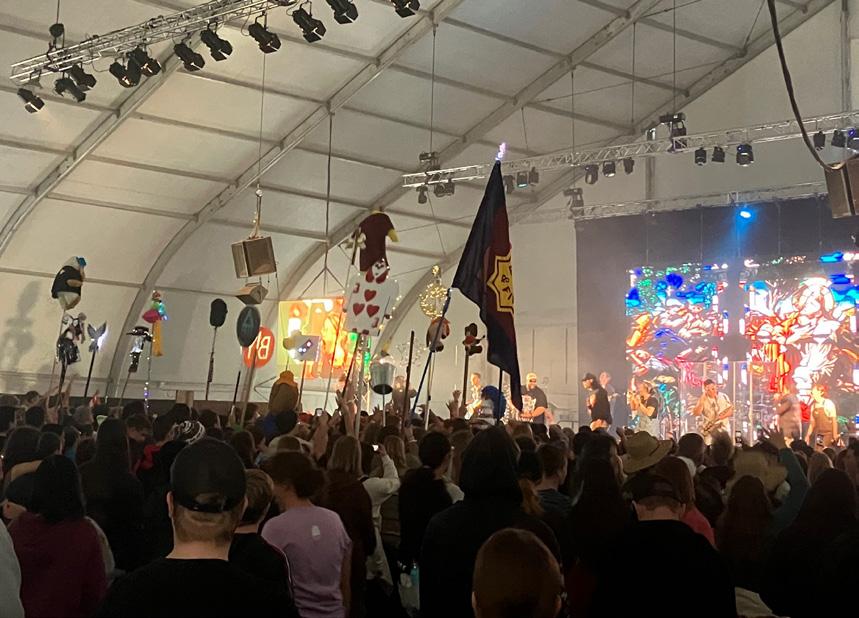
Outside of main sessions, a Salvation Army marquee was also set up as a hospitality area. This provided the base for many activities, such as card games, table tennis, foosball and air hockey. They also had small groups

which happened after the main sessions, where corps would split off into smaller gatherings to debrief and pray together.
Stuart reflected on this Easter Camp after the uncertainty due to Covid-19 over the past few years: ‘It was just so exciting to be together again as one community, as The Salvation Army’.
‘It’s so foundational for young people going to Easter Camp and learning about the Easter story’.
saltmagazine.org.nz 29
Above and Right: Scenes from the Southern Eastercamp at Spencer Park, Christchurch
Bridging the Christchurch Community for 50 Years
Christchurch Bridge celebrated 50 years of addiction services in their community on Monday 17 April. Their celebration was well attended, with current and ex-clients, family members and staff all present to recognise the valuable work of the numerous programmes and services run through the Bridge. Those in attendance had the privilege of hearing stories from previous clients of the Bridge programmes.
Hastings Wear Black and White for Cyclone Impact
Hastings Family Store banded together with the Hawke’s Bay community for Black and White Day on 6 April to display their support for those impacted by Cyclone Gabrielle and the devastation across the region. The initiative was started by local residents and encouraged schools, businesses and individuals to wear black and white and decorate their store windows in support of those who were personally affected by the cyclone.
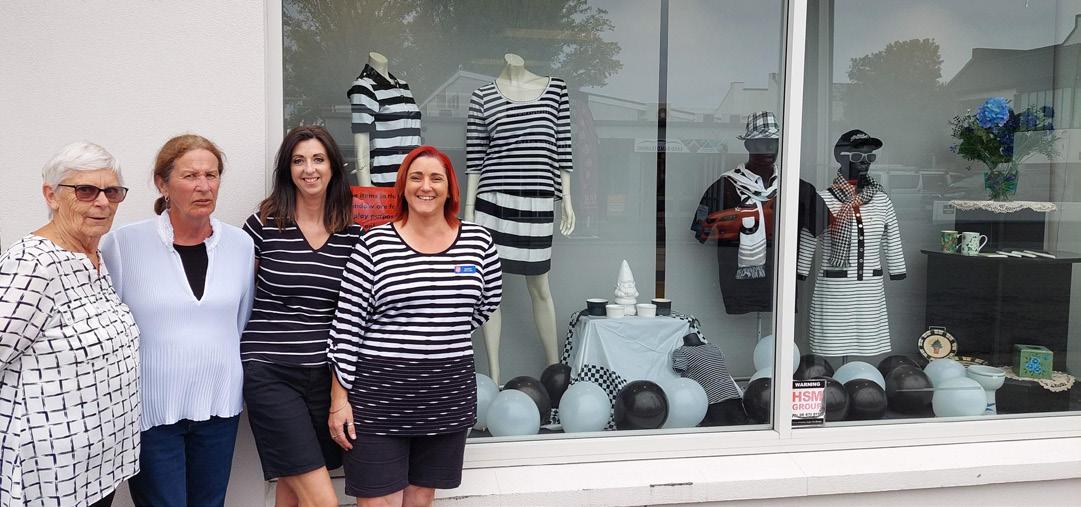
Listen + Learn = Love
New Home for Wellington Inner City Ministries
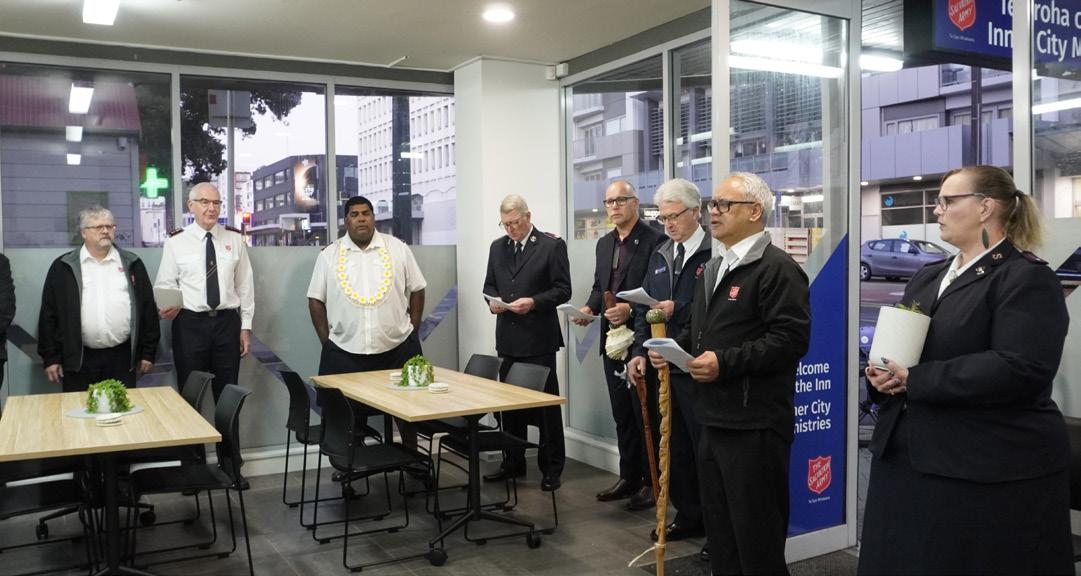
Wellington Inner City Ministries has had an exciting development in its mission. Te Whare Tira—The Inn officially opened on Wednesday 12 April with a kawanga whare, a formal Māori blessing for the building. The whare is located in the heart of Wellington on Taranaki Street and will be a place for Major Joe Serevi to further the work he does with those in the inner-city community.
A beautifully diverse and vibrant kaleidoscope of people of all ages, backgrounds, ethnicities, denominations and expressions of gender and sexuality gathered in Christchurch for the Awaken Conference. Organised by Diverse Church New Zealand, Awaken 2023 took place over the weekend of March 17–19, and was hosted by Durham Street North Methodist Church.
Rotorua Personalities Pitch in Behind Foodbank
An inaugural charity event in Rotorua has contributed muchneeded food and cash donations to the local Salvation Army foodbank. ‘Kick for a Cause Rotorua’ brought together 44 local personalities, divided into four teams, for an afternoon of social football. The charity event, which was organised by local people, collected some 269 cans and food items along with more than $2300 in donations.
Go to our website— saltmagazine.org.nz—to access the full news stories, plus further news as it is reported.
30 May 2023
Big Tick for CubaDupa

Wellington’s iconic street festival CubaDupa returned this year following a break due to Covid-19. Cuba Street was once again bursting with music, art, food, theatre and dance, with The Salvation Army Cuba Street right in the thick of it with the doors wide open! The Hamodava Coffee Shop served coffee, and each day there was a line-up of curated musical performances.
Auckland City Celebrates
Auckland City Corps celebrated 140 years of operating in New Zealand during the Easter weekend, with ‘remembering’ on Good Friday, ‘celebrating’ on Holy Saturday and ‘looking forward’ on Resurrection Sunday. Colonel Gerry Walker and Captain Kristine Walker (Rtd) were the guest leaders for the weekend, as Auckland City Corps was the very first Salvation Army corps they attended.
Tonga Community Garden Project
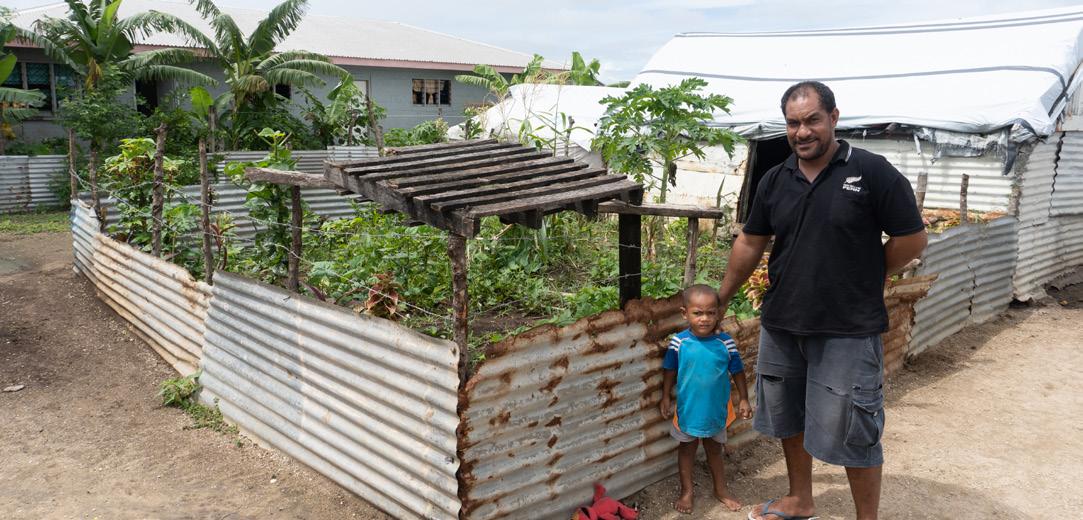
Patangata, at the eastern end of Nuku’alofa, occupies a very low-lying strip of land; the village is often flooded during severe weather events. The Tonga volcano eruption and subsequent tsunami stripped the village of top soil. After consultation with the community leaders, the Patangata Garden Project was established to assist households to grow their own vegetable gardens. Go to the video link provided in the online article to see the devastation.
Dunedin 140 Years Celebrations
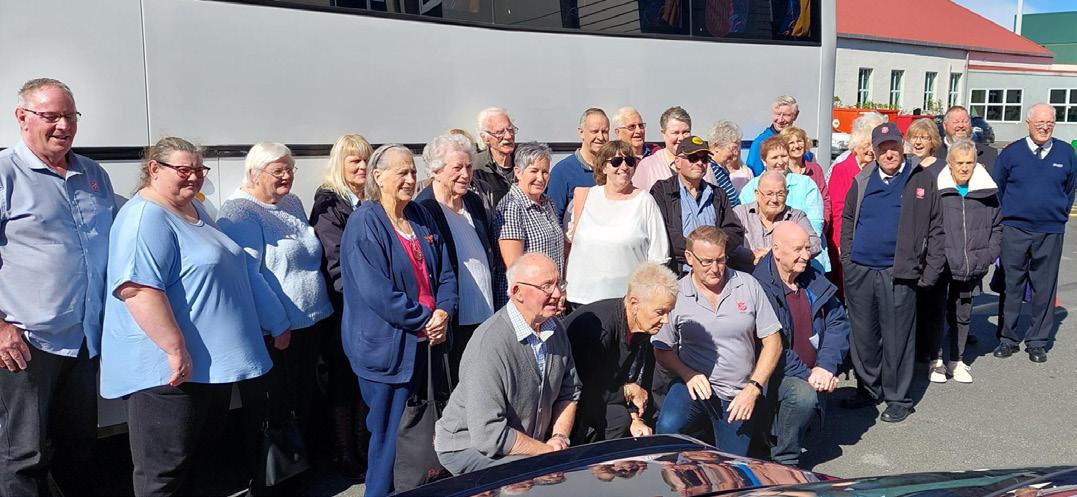
Dunedin City Corps recently celebrated 140 years of The Salvation Army operating in New Zealand with various activities to educate and inspire people about the Army’s history. This included a bus tour to 40 historic Salvation Army points, an open air meeting at the Cargill Monument and a video including a re-enactment of the boat landing of the first Salvationists to arrive in New Zealand.
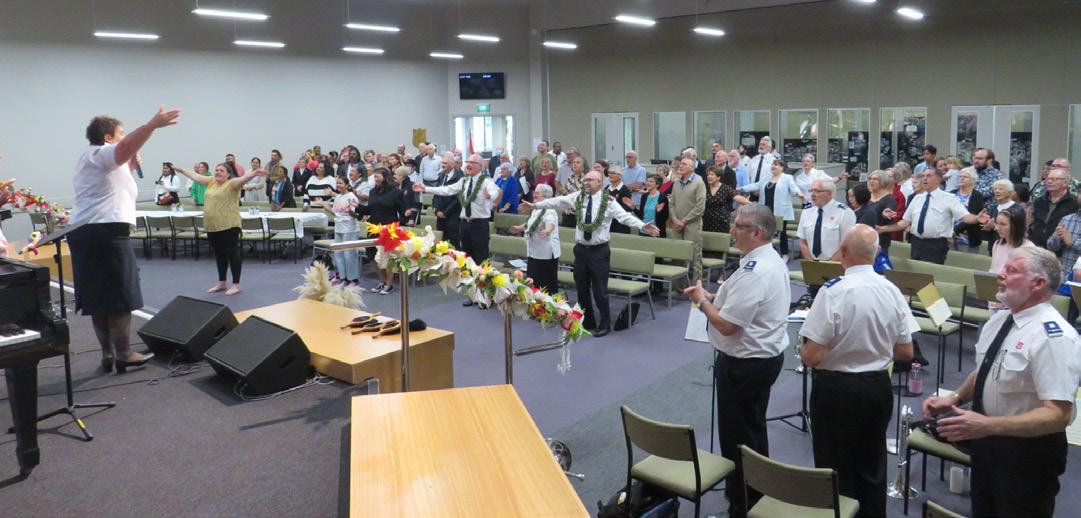
Looking for more news?
Read the latest news online at saltmagazine.org.nz
saltmagazine.org.nz 31
Official Engagements
Commissioners Mark (Territorial Commander) and Julie Campbell (Territorial President of Women’s Ministries)
18 May–3 June: High Council, London, UK
Colonel Gerry Walker (Chief Secretary)
17 May: Spiritual Day, Booth College of Mission
Lt-Colonel Liz Gainsford (Territorial Secretary for Spiritual Life Development)
17 May: Spiritual Day, Booth College of Mission
Gazette Summary
To read the full version of Gazette notices, visit saltmagazine.org.nz/gazette

Additional appointments: Effective immediately : Captain Stephen Molen is appointed as CLD Facilitator (Missional Stream) at Te Whare Wananga O Nga Toa Whakaora (Booth College of Mission), as an additional appointment based in Auckland.
Effective 27 April 2023: Major Miriama Simanu is appointed Chair, Auckland Pasifika Advisory Group, Northern Division—Auckland and Northland Areas Pilot.


Appointment in Retirement: Effective immediately : Commissioners Alistair and Astrid Herring are appointed as Northern Region Support Officers, Officer Support Unit, Northern Division— Auckland and Northland Areas Pilot.

Invercargill Corps celebrates 140th Anniversary
with Majors John and Kay Richards as guest leaders and with the support of the National Youth Band
For more information and to confirm your attendance, please contact: Major Iliesa
Quiz Answers: 1. Marathon, 2. Prunes, 3. 1970, 4. 1999, 5. Hong Kong. More details to come. For inquiries call (03) 448 9436 Alexandra
40+
Corps
SAVE THE DATE 50 years of The Salvation Army in Fiji 1973–2023 MARCHING ON: 50 Years Strong Founded on Faith; Inspired by Hope; Serving with Love
Cola
32 May 2023
or Captain Beth Campkin fiji.dhq@salvationarmy.org.fj
SALVATIONISTS IN HISTORY
Jailed for Jesus
The Salvation Army has a rich and varied past which is preserved at the Heritage Centre and Archives Centre (Plowman Resource Centre, Upper Hutt). In this edition of Salvationists in History, we look at the experience of Captain Ellen Gibson (1862–1953) and tell her story of being jailed for Jesus.
Many Salvationists will be familiar with the late 19th century accounts of officers and soldiers imprisoned for marching through the streets with flags, playing loud instruments to draw a crowd and preaching the gospel outdoors. Within that group were a handful of courageous young women—often not named in War Cry or local newspapers but referenced only by their gender. For example, in 1885 ‘two women’ were charged with ‘maliciously disturbing the inhabitants of Waimate by beating tambourines on a Sunday’. However, serving in Hastings at the time, Captain Ellen Gibson’s name is recorded.
Ellen was raised in the Methodist Church, but in 1886—just three years after The Salvation Army was founded in New Zealand—she left her home in Nelson convinced of God’s calling to officership. Ellen was in her early twenties. No record exists of her earliest appointments, but War Cry records that Ellen was known for her singing ability and her persuasive preaching. ‘Captain Gibson used her gifts not only to overcome opposition but also to win souls. She was successful in both.’

Ellen was the first female officer to lead Palmerston North Corps—an appointment that was challenging and brought ‘sharp reactions from many sections of the community but concluded with a splendid record of victories’. But it was her appointment to Hastings that resulted in her arrest.
Across the country, town councils had been passing bylaws to prohibit outdoor ‘disturbances’ caused by The Salvation Army; not mentioned by name in said bylaws, however the inference is clear. For example, in bylaw no. 26 of the Napier Borough Council, passed in 1885: ‘No persons shall be allowed … to play any
musical instrument, beat any drum, or sing any song or carry for the purpose of display any flag or torch, in any private or public place in the said borough’. In defiance of such bylaws, many Salvationists were arrested and imprisoned.
Tensions came to a head with member of parliament and future Prime Minister Richard John Seddon speaking up against those who opposed the Army and appealing to the Minister of Justice: ‘Will the minister refuse in future to recommend the sanction of the Crown being given to any bylaws having for their object the suppression of The Salvation Army … who is yearly saving a large amount of money to the state, redeeming persons that no other sect, nor the state itself, is able to deal with?’
It was into this highly charged atmosphere that Captain Ellen Gibson and her lieutenant refused to ‘cease preaching the gospel’ and were charged with ‘walking in procession’ in the streets of Hastings and imprisoned. There was a public outcry of injustice at ‘respectable women’ being imprisoned. Seddon’s influence resulted in Ellen and her lieutenant’s release. War Cry printed the headline: ‘Two Lasses Sent to Gaol’, with Ellen’s own brief but triumphant report stating: ‘[Sergeant] Major, Lieutenant, and self, jailed for Jesus Friday: Saturday farewell meeting good: one soul. Hallelujah!’
Soon afterward Ellen married Captain Joseph Hildreth, who had also been imprisoned elsewhere. The couple served together in 35 appointments, raised four boys and celebrated their 60th wedding anniversary in 1955. Ellen served as an active officer for 41 years and was promoted to Glory (passed away) at 92 years old.
saltmagazine.org.nz 33
The Language of Love
Children often hear about the importance of loving God, loving yourself, loving your family and loving other people. However, it might be a hard concept for children to grasp if their understanding and experience of love looks different.

Parents and caregivers are one of the most important influencers in the lives of their children. Young people learn from what their caregiver does and says, their attitudes and how they address the world around them. Our displays of love towards our children and others shows them an outworking of the practical nature of love.
Recently a corps (church) offered a teaching series about the Greatest Commandment, where they talked about practical love in community. This corps family then rewrote 1 Corinthians 13:4–7 and asked the children (of varying ages) what they thought practical love looked like. Here are some of their contributions:

Love says, ‘Hi’.
Love gives a smile.
Love is sharing lollipops.
Love is including the new person at school.
Love prays for people who are sick.
Love looks out for others.
Love is playing with your friends.
Love tells the truth.
Love is saying sorry.
Love looks for the best in others.
It’s great for children to think about practical love and then apply this learning to their own lives.
• Find some ways to talk about God’s love for them. You could read them a story from The Jesus Storybook Bible or play them a song.
• Ask them what they think love looks like and then write it down. This also gives you the opportunity to contribute.
• Encourage them to show practical love from the list you’ve created together.
Mother’s Day Craft
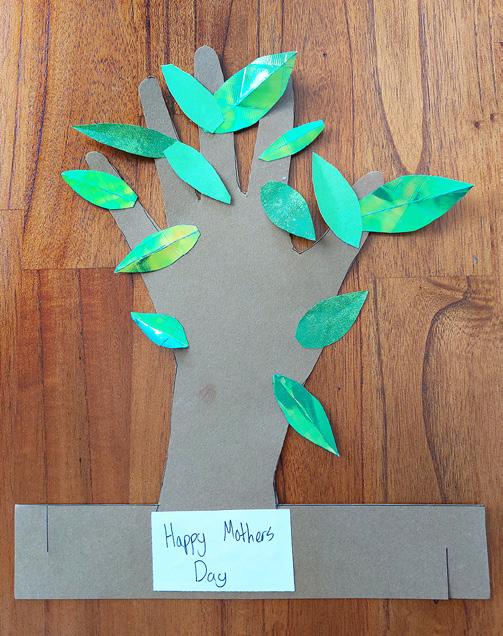
You will need:
• Brown cardboard
• Pencil
• Scissors (and an adult helper)
• Coloured paper
• Glue stick
4. Use a small rectangle piece of paper to write ‘Happy Mother’s Day’ and stick this to the base of the hand.
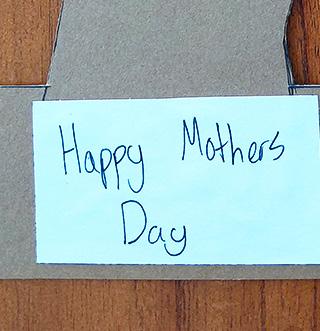
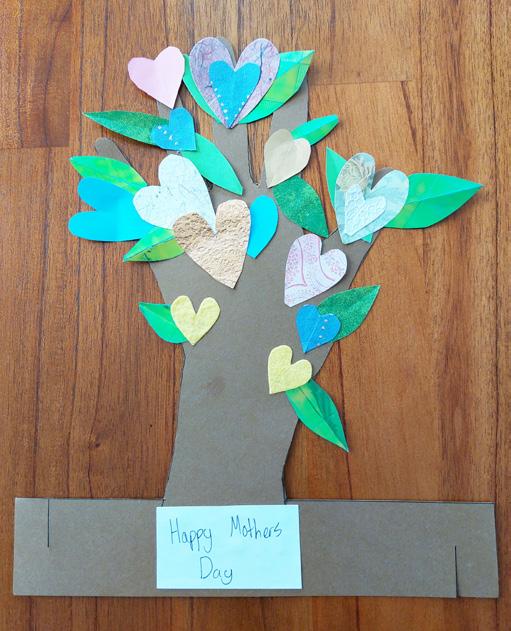
5. Fold small pieces of different coloured paper in half and cut hearts and leaves out of them. Use as many colours as you like.

1. Draw an outline of your hand on a piece of brown cardboard.
2. Draw a horizontal line at the base of the hand, about 4cm from the bottom of the paper. Draw two opposite 2cm lines, one at the top of the line on the left side of the hand, and one at the bottom of the page on the right side of the hand (see photo above labelled A and B).

3. Cut out the hand including the panel at the bottom of the hand. Cut along lines A and B.
6. Glue the hearts and leaves onto the cardboard hand near the fingers.
34 May 2023
7. Write words to describe your mum on the hearts and leaves.


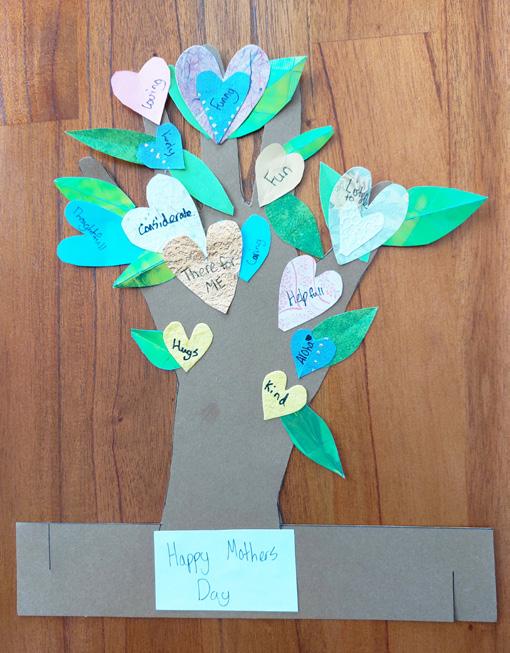
Love Each Other
Read: In this chapter, Jesus is talking to his friends, the disciples, at their last meal together. Jesus takes time to wash his friends’ feet, shares food with them and tells them that he will be with them only a little longer. Jesus knew that shortly he would be handed over to be crucified, but the disciples didn’t understand what he was saying. He gave them a new command, to love each other just as he had loved them.
8. Slot the two cuts (A and B) into each other to make the tree stand up.
9. Enjoy giving this to your mum, grandma or other significant woman in your life.
Special thanks to 0livia Montgomery for recreating this craft for our readers!
Source: krokotak.com/ 2015/01/flowering-treefrom-a-kids-hand/
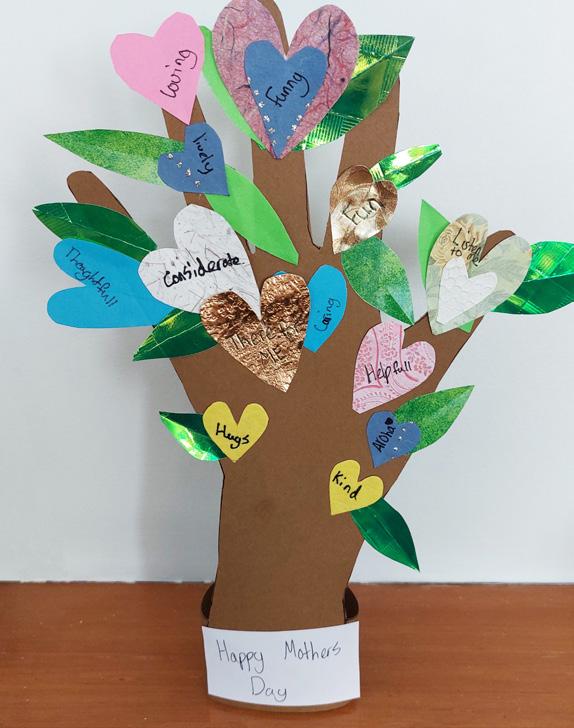
Think: Jesus showed love to his friends in practical ways because he wanted them to know that he cared about them. How did he do this? He listened. He was patient, helping them to understand. He taught them about his Father in heaven. He shared long walks with them and lots of food. He made time to care about their lives. Jesus says that we need to love each other so that others will know that we are his disciples. Being a life-long follower of Jesus means we want to show others the kind of love Jesus has for us.
Pray: God sent Jesus to be your friend because he loves you so much. Say a prayer of thanks to God for his great love for you. Ask Jesus to show you ways that you can share practical love with people in your life. You could pray for someone who doesn’t yet know Jesus’ love in their life.



Do: Think of some practical ways you can show love to the people in your whānau, friends, school and faith community. This may include doing something nice for them, like making them a card, or cleaning up your bedroom, taking time to listen, or spending time doing something fun together like playing at the park or hanging out at school.

‘So now I am giving you a new commandment: Love each other. Just as I have loved you, you should love each other. Your love for one another will prove to the world that you are my disciples.’ John 13:34–35
saltmagazine.org.nz 35
All God’s children need travelling shoes.
 Maya Angelou
Maya Angelou















 By Major Sue Hay
Stepping into Life twelve-step Meditations for Aotearoa
| Directed by Oliver Hermanus | See in theatres or watch on Amazon Prime
By Major Sue Hay
Stepping into Life twelve-step Meditations for Aotearoa
| Directed by Oliver Hermanus | See in theatres or watch on Amazon Prime



































































 Maya Angelou
Maya Angelou










